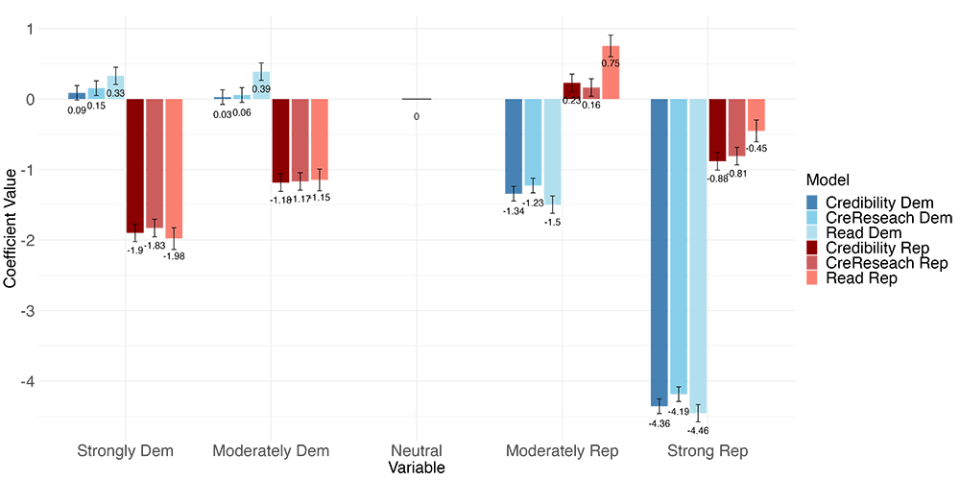
How to preserve academic credibility when engaging with social media
As political expression on social media can harm public perception of scientists, strategies such as sharing research, separating personal and professional identities, and engaging objectively are ways that academics can use it effectively while preserving credibility
Social media platforms such as X (formerly Twitter) are essential for academics to share research, network and engage with the public. However, navigating these platforms can undermine researchers’ credibility. Scientists’ political expression on social media significantly affects how the public perceives them, we found in a study of about 98,000 scientists and experiments with 3,700 respondents, all based in the US. Maintaining credibility depends on how academics communicate online.
Here are practical tips from our findings to help academics engage on social media without compromising their standing.
Focus on research, not politics
Neutrality is paramount for credibility, our study found. Scientists who share politically charged opinions face a credibility penalty. Figure 1 shows that the stronger the political stance, the more public trust declines as well as public willingness to engage with scientific content. In our experiment, both strongly Republican and strongly Democratic scientists experience a reduction in perceived credibility, by 39 per cent and 11 per cent respectively, compared with their politically neutral counterparts.
- Spotlight collection: how to make social media an academic friend, not foe
- Making the most of social media: practical tips for academics
- Read more: shifting landscapes of social media data for research
To maintain credibility, scientists might choose to prioritise sharing research findings over engaging in partisan debates. Focusing on discussions related to their own work can help scientists preserve public trust, as audiences tend to value expertise-based opinions over political ones.

Note: The chart shows that across the political spectrum, scientists experience a significant monotonic decrease in perceived credibility and willingness to engage with their content as their political expressions become more pronounced. Source: Alabrese, Capozza and Garg (2024).
Be mindful of communication style
Globally, academics on social media are significantly more vocal on politicised issues than the general public – 10 times more likely to support climate action, six times more expressive about cultural liberalism, and 23 times more vocal about economic collectivism, according to companion work. While understandable, this disparity can mislead the public about academic consensus and potentially erode trust.
Additionally, the study finds notable differences in how academics express themselves. While generally less toxic than the broader social media user base, variations exist within academia. Academics in the US and those from top-ranked institutions tend to exhibit higher levels of egocentrism and toxicity relative to academics from other countries.
Being mindful of both content and tone not only preserves credibility but also fosters constructive engagement with a diverse audience.

Note: This figure presents average levels of egocentrism, toxicity and emotionality in tweets by academics, categorised by factors such as country, field and institutional ranking. Source: Garg and Fetzer (2024).
Separate personal and professional accounts
If political engagement is important, scientists should consider maintaining separate accounts – one for personal views and another for professional academic content. This allows scientists to engage in political discussions without having them mixed with the professional content and risking that it becomes compromised. Keeping a professional account strictly focused on research, academic commentary and educational content could help scientists preserve the trust of a more general audience, which is crucial for increasing the reach and impact of scientific work.
Use social media to educate, not advocate
While it’s tempting to advocate for causes one is passionate about, especially on pressing issues such as climate change or social justice, our research highlights a fine line between advocacy and information-sharing. On social media, academics shall aim to inform and educate about their field of expertise, with an approach that encourages public engagement without alienating those with differing views.
This perspective is reinforced by our survey of an international sample of scientists, who generally agree that expressing political views on topics within their expertise is more socially acceptable than commenting on issues outside their field. These scientists also believe that their peers share this sentiment. On average, scientists anticipate reputational benefits for discussing politically charged topics directly linked to their research, while noting the potential reputational risks that come when venturing beyond their professional scope.
Be mindful of your audience
Public perceptions of scientists vary and are heavily influenced by audience political affiliation. Our study shows that respondents are less willing to engage with scientists whose political views oppose their own (see Figure 3). This polarisation underscores the importance of being mindful of one's audience when communicating. Tailoring content to avoid alienating specific groups helps to maintain a broad readership and facilitates constructive engagement across the political spectrum.

Note: The graph shows how the penalty in perceived credibility and willingness to engage with content due to scientists’ political expression on social media is particularly strong among respondents whose political positions oppose those of the scientists. Source: Alabrese, Capozza and Garg (2024).
Institutional best practices
Johns Hopkins University recently adopted a “posture of restraint” in issuing official statements, limiting them to issues directly related to the university’s core functions. Leaders noted that public statements on social, political or scientific issues could be “counterproductive” and undermine open dialogue. This approach preserves the institution’s role as a space for diverse views.
This example serves as a model for individual academics. Focusing on fostering dialogue and advancing knowledge, rather than taking positions on contentious issues, helps maintain credibility and public trust in scientific expertise.
Opportunities and challenges of social media for academics
Social media enables wider dissemination of research but also exposes scientists to scrutiny, where political views can impact public trust. By sharing research, separating personal and professional identities, and engaging objectively, academics can use social media effectively while preserving credibility.
As digital communication evolves, science communication strategies must adapt to maintain public trust. For scientists, social media should be a platform for education and outreach, not a battleground for political ideology.
Eleonora Alabrese is an assistant professor in the department of economics at the University of Bath. Francesco Capozza is a research associate in the WZB Berlin Social Science Center. Prashant Garg is an economics PhD student at Imperial College Business School.
If you would like advice and insight from academics and university staff delivered direct to your inbox each week, sign up for the Campus newsletter.


